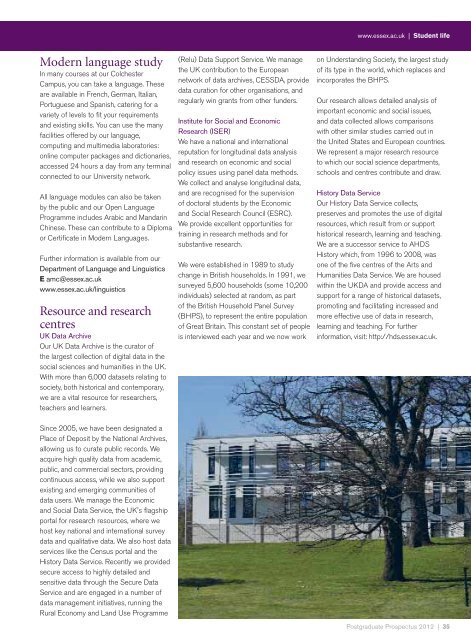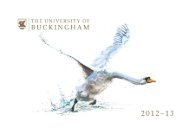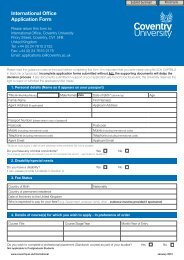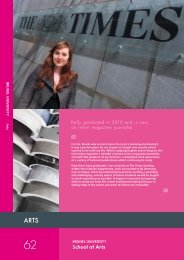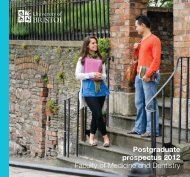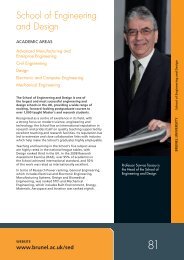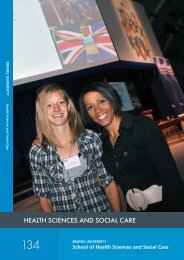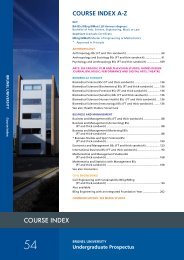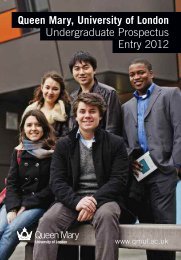Postgraduate Prospectus
Postgraduate Prospectus
Postgraduate Prospectus
You also want an ePaper? Increase the reach of your titles
YUMPU automatically turns print PDFs into web optimized ePapers that Google loves.
www.essex.ac.uk | Student life<br />
Modern language study<br />
In many courses at our Colchester<br />
Campus, you can take a language. These<br />
are available in French, German, Italian,<br />
Portuguese and Spanish, catering for a<br />
variety of levels to fit your requirements<br />
and existing skills. You can use the many<br />
facilities offered by our language,<br />
computing and multimedia laboratories:<br />
online computer packages and dictionaries,<br />
accessed 24 hours a day from any terminal<br />
connected to our University network.<br />
All language modules can also be taken<br />
by the public and our Open Language<br />
Programme includes Arabic and Mandarin<br />
Chinese. These can contribute to a Diploma<br />
or Certificate in Modern Languages.<br />
Further information is available from our<br />
Department of Language and Linguistics<br />
E amc@essex.ac.uk<br />
www.essex.ac.uk/linguistics<br />
Resource and research<br />
centres<br />
UK Data Archive<br />
Our UK Data Archive is the curator of<br />
the largest collection of digital data in the<br />
social sciences and humanities in the UK.<br />
With more than 6,000 datasets relating to<br />
society, both historical and contemporary,<br />
we are a vital resource for researchers,<br />
teachers and learners.<br />
Since 2005, we have been designated a<br />
Place of Deposit by the National Archives,<br />
allowing us to curate public records. We<br />
acquire high quality data from academic,<br />
public, and commercial sectors, providing<br />
continuous access, while we also support<br />
existing and emerging communities of<br />
data users. We manage the Economic<br />
and Social Data Service, the UK's flagship<br />
portal for research resources, where we<br />
host key national and international survey<br />
data and qualitative data. We also host data<br />
services like the Census portal and the<br />
History Data Service. Recently we provided<br />
secure access to highly detailed and<br />
sensitive data through the Secure Data<br />
Service and are engaged in a number of<br />
data management initiatives, running the<br />
Rural Economy and Land Use Programme<br />
(Relu) Data Support Service. We manage<br />
the UK contribution to the European<br />
network of data archives, CESSDA, provide<br />
data curation for other organisations, and<br />
regularly win grants from other funders.<br />
Institute for Social and Economic<br />
Research (ISER)<br />
We have a national and international<br />
reputation for longitudinal data analysis<br />
and research on economic and social<br />
policy issues using panel data methods.<br />
We collect and analyse longitudinal data,<br />
and are recognised for the supervision<br />
of doctoral students by the Economic<br />
and Social Research Council (ESRC).<br />
We provide excellent opportunities for<br />
training in research methods and for<br />
substantive research.<br />
We were established in 1989 to study<br />
change in British households. In 1991, we<br />
surveyed 5,600 households (some 10,200<br />
individuals) selected at random, as part<br />
of the British Household Panel Survey<br />
(BHPS), to represent the entire population<br />
of Great Britain. This constant set of people<br />
is interviewed each year and we now work<br />
on Understanding Society, the largest study<br />
of its type in the world, which replaces and<br />
incorporates the BHPS.<br />
Our research allows detailed analysis of<br />
important economic and social issues,<br />
and data collected allows comparisons<br />
with other similar studies carried out in<br />
the United States and European countries.<br />
We represent a major research resource<br />
to which our social science departments,<br />
schools and centres contribute and draw.<br />
History Data Service<br />
Our History Data Service collects,<br />
preserves and promotes the use of digital<br />
resources, which result from or support<br />
historical research, learning and teaching.<br />
We are a successor service to AHDS<br />
History which, from 1996 to 2008, was<br />
one of the five centres of the Arts and<br />
Humanities Data Service. We are housed<br />
within the UKDA and provide access and<br />
support for a range of historical datasets,<br />
promoting and facilitating increased and<br />
more effective use of data in research,<br />
learning and teaching. For further<br />
information, visit: http://hds.essex.ac.uk.<br />
<strong>Postgraduate</strong> <strong>Prospectus</strong> 2012 | 35


